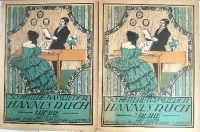Latest Sheet Music
Metallica

Metallica is an American heavy metal band that formed in 1981 in Los Angeles, California. Founded when drummer Lars Ulrich posted an advertisement in a Los Angeles newspaper, Metallica's original line-up consisted of Ulrich, rhythm guitarist and vocalist James Hetfield, lead guitarist Dave Mustaine, and bassist Ron McGovney. These last two were later replaced from the band, in favor of Kirk Hammett and Cliff Burton, respectively. In September 1986, Metallica's tour bus skidded out of control and flipped, which resulted in Burton being crushed under the bus and killed. Jason Newsted replaced him less than two months later. Newsted left the band in 2001 and was replaced by Robert Trujillo in 2003.
Metallica's early releases included fast tempos, instrumentals, and aggressive musicianship that placed them as one of the "Big Four" of the thrash metal subgenre alongside Slayer, Megadeth and Anthrax. The band earned a growing fan base in the underground music community, and some critics say the 1986 release Master of Puppets is one of the most influential and "heavy" thrash metal albums. The band achieved substantial commercial success with its self-titled 1991 album, which debuted at number one on the Billboard 200. Some critics and fans believed the band changed its musical direction to appeal to the mainstream audience. With the release of Load in 1996, Metallica distanced itself from earlier releases in what has been described as "an almost alternative rock approach", and the band faced accusations of "selling out".
In 2000, Metallica was among several artists who filed a lawsuit against Napster for sharing the band's copyright-protected material for free without the band members' consent. A settlement was reached, and Napster became a pay-to-use service. Despite reaching number one on the Billboard 200, the release of St. Anger in 2003 disappointed some critics and fans with the exclusion of guitar solos, and the "steel-sounding" snare drum. A film titled Some Kind of Monster documented the recording process of St. Anger.
Metallica's early releases included fast tempos, instrumentals, and aggressive musicianship that placed them as one of the "Big Four" of the thrash metal subgenre alongside Slayer, Megadeth and Anthrax. The band earned a growing fan base in the underground music community, and some critics say the 1986 release Master of Puppets is one of the most influential and "heavy" thrash metal albums. The band achieved substantial commercial success with its self-titled 1991 album, which debuted at number one on the Billboard 200. Some critics and fans believed the band changed its musical direction to appeal to the mainstream audience. With the release of Load in 1996, Metallica distanced itself from earlier releases in what has been described as "an almost alternative rock approach", and the band faced accusations of "selling out".
In 2000, Metallica was among several artists who filed a lawsuit against Napster for sharing the band's copyright-protected material for free without the band members' consent. A settlement was reached, and Napster became a pay-to-use service. Despite reaching number one on the Billboard 200, the release of St. Anger in 2003 disappointed some critics and fans with the exclusion of guitar solos, and the "steel-sounding" snare drum. A film titled Some Kind of Monster documented the recording process of St. Anger.
Edvard Grieg

Edvard Hagerup Grieg (15 June 1843 – 4 September 1907) was a Norwegian composer and pianist who composed in the Romantic period. He is best known for his Piano Concerto in A minor, for his incidental music to Henrik Ibsen's play Peer Gynt (which includes Morning Mood and In the Hall of the Mountain King), and for his collection of piano miniatures Lyric Pieces. "Edvard" is sometimes mispelt as "Edward".
Grieg is renowned as a nationalist composer, drawing inspiration from Norwegian folk music. Early works include a symphony (which he later suppressed) and a piano sonata. He also wrote three sonatas for violin and piano and a cello sonata. His many short pieces for piano — often based on Norwegian folk tunes and dances — led some to call him the "Chopin of the North".
Concerto in A minor: 1. Allegro molto moderato
Performed by the University of Washington Symphony, conducted by Peter Erős (Neal O'Doan, piano)
Concerto in A minor: 1. Allegro molto moderato
Performed by the Skidmore College Orchestra (courtesy of Musopen)
Concerto in A minor: 2. Adagio
Performed by the University of Washington Symphony, conducted by Peter Erős (Neal O'Doan, piano)
Concerto in A minor: 2. Adagio
Performed by the Skidmore College Orchestra (courtesy of Musopen)
Concerto in A minor: 3. Allegro moderato molto e marcato
Performed by the University of Washington Symphony, conducted by Peter Erős (Neal O'Doan, piano)
Concerto in A minor: 3. Allegro moderato molto e marcato
Performed by the Skidmore College Orchestra (courtesy of Musopen)
Notturno, Op. 54, No. 4
Performed live by Mark Gasser
Problems listening to these files? See media help.
The Piano Concerto is his most popular work. Its champions have included the pianist and composer Percy Grainger, a personal friend of Grieg who played the concerto frequently during his long career. An arrangement of part of the work made an iconic television comedy appearance in the 1971 Morecambe and Wise Show, conducted by André Previn.
Some of the Lyric Pieces (for piano) are also well-known, as is the incidental music to Henrik Ibsen's play Peer Gynt, a play that Grieg found to be an arduous work to score properly. In a 1874 letter to his friend Frants Beyer, Grieg expressed his unhappiness with what is now considered one of his most popular compositions from Peer Gynt, In the Hall of the Mountain King: "I have also written something for the scene in the hall of the mountain King - something that I literally can't bear listening to because it absolutely reeks of cow-pies, exaggerated Norwegian nationalism, and trollish self-satisfaction! But I have a hunch that the irony will be discernible."
Grieg is renowned as a nationalist composer, drawing inspiration from Norwegian folk music. Early works include a symphony (which he later suppressed) and a piano sonata. He also wrote three sonatas for violin and piano and a cello sonata. His many short pieces for piano — often based on Norwegian folk tunes and dances — led some to call him the "Chopin of the North".
Concerto in A minor: 1. Allegro molto moderato
Performed by the University of Washington Symphony, conducted by Peter Erős (Neal O'Doan, piano)
Concerto in A minor: 1. Allegro molto moderato
Performed by the Skidmore College Orchestra (courtesy of Musopen)
Concerto in A minor: 2. Adagio
Performed by the University of Washington Symphony, conducted by Peter Erős (Neal O'Doan, piano)
Concerto in A minor: 2. Adagio
Performed by the Skidmore College Orchestra (courtesy of Musopen)
Concerto in A minor: 3. Allegro moderato molto e marcato
Performed by the University of Washington Symphony, conducted by Peter Erős (Neal O'Doan, piano)
Concerto in A minor: 3. Allegro moderato molto e marcato
Performed by the Skidmore College Orchestra (courtesy of Musopen)
Notturno, Op. 54, No. 4
Performed live by Mark Gasser
Problems listening to these files? See media help.
The Piano Concerto is his most popular work. Its champions have included the pianist and composer Percy Grainger, a personal friend of Grieg who played the concerto frequently during his long career. An arrangement of part of the work made an iconic television comedy appearance in the 1971 Morecambe and Wise Show, conducted by André Previn.
Some of the Lyric Pieces (for piano) are also well-known, as is the incidental music to Henrik Ibsen's play Peer Gynt, a play that Grieg found to be an arduous work to score properly. In a 1874 letter to his friend Frants Beyer, Grieg expressed his unhappiness with what is now considered one of his most popular compositions from Peer Gynt, In the Hall of the Mountain King: "I have also written something for the scene in the hall of the mountain King - something that I literally can't bear listening to because it absolutely reeks of cow-pies, exaggerated Norwegian nationalism, and trollish self-satisfaction! But I have a hunch that the irony will be discernible."
Chopin

Frédéric Chopin (1 March 1810 – 17 October 1849) was a Polish composer and virtuoso pianist of the Romantic period. He is widely regarded as the greatest Polish composer, and ranks as one of music's greatest tone poets.
He was born in the village of Żelazowa Wola, in the Duchy of Warsaw, to a Polish mother and French-expatriate father, and in his early life was regarded as a child-prodigy pianist. In November 1830, at the age of 20, Chopin went abroad; following the suppression of the Polish November Uprising of 1830–31, he became one of many expatriates of the Polish "Great Emigration."
In Paris, he made a comfortable living as a composer and piano teacher, while giving few public performances. A Polish patriot,
Chopin's extant compositions were written primarily for the piano as a solo instrument. Though technically demanding, Chopin's style emphasizes nuance and expressive depth rather than virtuosity. Chopin invented musical forms such as the ballade and was responsible for major innovations in forms such as the piano sonata, waltz, nocturne, étude, impromptu and prelude. His works are mainstays of Romanticism in 19th-century classical music.
He was born in the village of Żelazowa Wola, in the Duchy of Warsaw, to a Polish mother and French-expatriate father, and in his early life was regarded as a child-prodigy pianist. In November 1830, at the age of 20, Chopin went abroad; following the suppression of the Polish November Uprising of 1830–31, he became one of many expatriates of the Polish "Great Emigration."
In Paris, he made a comfortable living as a composer and piano teacher, while giving few public performances. A Polish patriot,
Chopin's extant compositions were written primarily for the piano as a solo instrument. Though technically demanding, Chopin's style emphasizes nuance and expressive depth rather than virtuosity. Chopin invented musical forms such as the ballade and was responsible for major innovations in forms such as the piano sonata, waltz, nocturne, étude, impromptu and prelude. His works are mainstays of Romanticism in 19th-century classical music.
Brahms

Johannes Brahms (May 7, 1833 â April 3, 1897) was a German composer of the Romantic period. He was born in Hamburg and in his later years he settled in Vienna, Austria.
Brahms maintained a Classical sense of form and order in his works â in contrast to the opulence of the music of many of his contemporaries. Thus many admirers (though not necessarily Brahms himself) saw him as the champion of traditional forms and "pure music," as opposed to the New German embrace of program music.
Brahms venerated Beethoven: in the composer's home, a marble bust of Beethoven looked down on the spot where he composed, and some passages in his works are reminiscent of Beethoven's style. The main theme of the finale of Brahms's First Symphony is reminiscent of the main theme of the finale of Beethoven's Ninth, and when this resemblance was pointed out to Brahms he replied that any ass â jeder Esel â could see that.
Ein deutsches Requiem was partially inspired by his mother's death in 1865, but also incorporates material from a Symphony he started in 1854, but abandoned following Schumann's suicide attempt. He once wrote that the Requiem "belonged to Schumann". The first movement of this abandoned Symphony was re-worked as the first movement of the First Piano Concerto.
Brahms also loved the Classical composers Mozart and Haydn. He collected first editions and autographs of their works, and edited performing editions. He also studied the music of pre-classical composers, including Giovanni Gabrieli, Johann Adolph Hasse, Heinrich Schütz and especially Johann Sebastian Bach. His friends included leading musicologists, and with Friedrich Chrysander he edited an edition of the works of François Couperin. He looked to older music for inspiration in the arts of strict counterpoint; the themes of some of his works are modelled on Baroque sources, such as Bach's The Art of Fugue in the fugal finale of Cello Sonata No. 1, or the same composer's Cantata No. 150 in the passacaglia theme of the Fourth Symphony's finale.
Brahms maintained a Classical sense of form and order in his works â in contrast to the opulence of the music of many of his contemporaries. Thus many admirers (though not necessarily Brahms himself) saw him as the champion of traditional forms and "pure music," as opposed to the New German embrace of program music.
Brahms venerated Beethoven: in the composer's home, a marble bust of Beethoven looked down on the spot where he composed, and some passages in his works are reminiscent of Beethoven's style. The main theme of the finale of Brahms's First Symphony is reminiscent of the main theme of the finale of Beethoven's Ninth, and when this resemblance was pointed out to Brahms he replied that any ass â jeder Esel â could see that.
Ein deutsches Requiem was partially inspired by his mother's death in 1865, but also incorporates material from a Symphony he started in 1854, but abandoned following Schumann's suicide attempt. He once wrote that the Requiem "belonged to Schumann". The first movement of this abandoned Symphony was re-worked as the first movement of the First Piano Concerto.
Brahms also loved the Classical composers Mozart and Haydn. He collected first editions and autographs of their works, and edited performing editions. He also studied the music of pre-classical composers, including Giovanni Gabrieli, Johann Adolph Hasse, Heinrich Schütz and especially Johann Sebastian Bach. His friends included leading musicologists, and with Friedrich Chrysander he edited an edition of the works of François Couperin. He looked to older music for inspiration in the arts of strict counterpoint; the themes of some of his works are modelled on Baroque sources, such as Bach's The Art of Fugue in the fugal finale of Cello Sonata No. 1, or the same composer's Cantata No. 150 in the passacaglia theme of the Fourth Symphony's finale.
Francis Lai
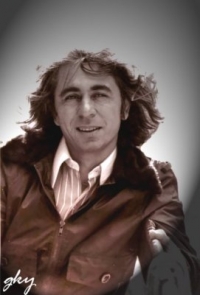
Francis Lai (born April 26, 1932 in Nice, Alpes-Maritimes, France) is a composer noted for his film scores.
While in his twenties, Francis Lai left home and went to Paris where he became part of the lively Montmartre music scene. In 1965 he met filmmaker Claude Lelouch and was hired to help write the score for the film, Un homme et une femme (A Man and A Woman). Released in 1966, the film was a major international success, earning a number of Academy Awards, and for the young Francis Lai, a Golden Globe Award nomination for "Best Original Score". This initial success brought more opportunities to work for the film industry both in his native France as well as in Great Britain and the United States. In 1969, he wrote the score for director René Clément's film, Rider On The Rain (Le Passager de la Pluie).
In 1970 Francis Lai won the Academy Award for Best Music, Original Score and the Golden Globe Award for Best Original Score for the film Love Story. In the United States, the soundtrack album went to No. 2 in the Billboard album charts and the film's theme, "Where Do I Begin" was a hit single with lyrics by Carl Sigman for traditional pop singer Andy Williams. The song would also be recorded successfully by Lai himself with a full orchestra and by Henry Mancini and Shirley Bassey. Francis Lai also wrote the music for the 1978 Love Story sequel titled Oliver's Story.
Lai has also had success with music written for softcore erotic films like Emmanuelle 2 (1975) and Bilitis (1977).
His composition Aujourd'hui C'est Toi is probably best known in the UK as the theme music for the long-running BBC television current affairs documentary series Panorama.
In a career spanning forty years, Francis Lai has also written music for television programs and alone or in collaboration with others has composed music for more than one hundred films and has personally written more than six hundred songs.
While in his twenties, Francis Lai left home and went to Paris where he became part of the lively Montmartre music scene. In 1965 he met filmmaker Claude Lelouch and was hired to help write the score for the film, Un homme et une femme (A Man and A Woman). Released in 1966, the film was a major international success, earning a number of Academy Awards, and for the young Francis Lai, a Golden Globe Award nomination for "Best Original Score". This initial success brought more opportunities to work for the film industry both in his native France as well as in Great Britain and the United States. In 1969, he wrote the score for director René Clément's film, Rider On The Rain (Le Passager de la Pluie).
In 1970 Francis Lai won the Academy Award for Best Music, Original Score and the Golden Globe Award for Best Original Score for the film Love Story. In the United States, the soundtrack album went to No. 2 in the Billboard album charts and the film's theme, "Where Do I Begin" was a hit single with lyrics by Carl Sigman for traditional pop singer Andy Williams. The song would also be recorded successfully by Lai himself with a full orchestra and by Henry Mancini and Shirley Bassey. Francis Lai also wrote the music for the 1978 Love Story sequel titled Oliver's Story.
Lai has also had success with music written for softcore erotic films like Emmanuelle 2 (1975) and Bilitis (1977).
His composition Aujourd'hui C'est Toi is probably best known in the UK as the theme music for the long-running BBC television current affairs documentary series Panorama.
In a career spanning forty years, Francis Lai has also written music for television programs and alone or in collaboration with others has composed music for more than one hundred films and has personally written more than six hundred songs.
Rocco Granata
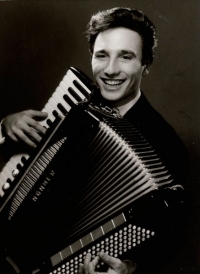
Rocco Granata is an Italian-Belgian singer, songwriter, and accordionist. Granata was born in Figline Vegliaturo, Calabria, southern Italy; but his parents immigrated to Belgium when he was aged ten. Rocco's father was a coal miner, but Granata pursued music instead.
Rick Astley

Richard Paul Astley (born 6 February 1966) is an English singer, songwriter and radio personality, who has been active in music for several decades. He gained worldwide fame in the 1980s, having multiple hits including his signature song "Never Gonna Give You Up", "Together Forever" and "Whenever You Need Somebody", and returned to music full-time in the 2000s. Outside his music career, Astley has occasionally worked as a radio DJ and a podcaster.Born and raised in Lancashire, Astley became a musician after leaving school, as the drummer for the soul band FBI. Three years later, he rose to fame through his association with the production trio Stock Aitken Waterman; releasing the 1987 album Whenever You Need Somebody, which sold 15.2 million copies worldwide. His debut single "Never Gonna Give You Up" was a number 1 hit single in 25 countries, winning the 1988 Brit Award for Best British Single.
David Burke

David Burke is a musician & adventurer.His recent EP 'Hello Ocean' contains exciting, uplifting songs capturing the carefree, backpacking experience of Australia, New Zealand & South East Asia.Debut album 'Where Colours Swim' - No.1 on iTunes and RTE Radio 1 'Album of the Week' - see 'Music' button above.Hot Press Magazine - "Melodic & catchy with memorable choruses & impressive arrangements." "One of the finest domestic releases of the year...finds the singer at the top of his game, and is an excellent follow-on from his album."
Phoebe Knapp
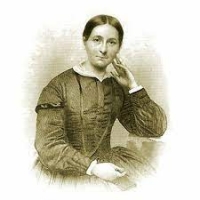
Phoebe Palmer Knapp (March 9, 1839 – July 10, 1908) was an American composer of music for hymns and an organist.
Knapp was born in New York City. Her parents were Walter C. Palmer and Phoebe Worrall Palmer. She married Joseph Fairchild Knapp, one of the founders and the second president of the Metropolitan Life Insurance Company. He had a pipe organ installed in their apartment.She and her husband were members of the John Street Methodist Episcopal Church in New York City. The hymn writer Fanny Crosby was also a member of that church and a friend of Palmer's.
Knapp was born in New York City. Her parents were Walter C. Palmer and Phoebe Worrall Palmer. She married Joseph Fairchild Knapp, one of the founders and the second president of the Metropolitan Life Insurance Company. He had a pipe organ installed in their apartment.She and her husband were members of the John Street Methodist Episcopal Church in New York City. The hymn writer Fanny Crosby was also a member of that church and a friend of Palmer's.
james newton howard
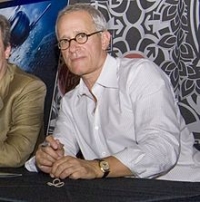
James Newton Howard (born June 9, 1951) is an American composer, conductor, and music producer. He has scored over 100 films and is the recipient of a Grammy Award, Emmy Award, and eight Academy Award nominations. His film scores include Pretty Woman (1990), The Fugitive (1993), The Devil's Advocate (1997), Dinosaur (2000), Atlantis: The Lost Empire (2001), Treasure Planet (2002), King Kong (2005), Batman Begins (2005), Blood Diamond (2006), The Dark Knight (2008), The Bourne Legacy (2012), The Hunger Games series (2012–2015) and Fantastic Beasts and Where to Find Them (2016). He has collaborated with directors M. Night Shyamalan, having scored nine of his films since The Sixth Sense, and Francis Lawrence, having scored all of his films since I Am Legend.
Sally DeFord

Sally DeFord Musical artist Born: 1959 (age 60 years), Eugene, Oregon, United States
Record labels: Defordmusic, Defordmusic.com, Sally DeFord Music, Sally DeFord
Genres: Alt Contemporary Christian, Christian/Gospel
Albums: He Is My Song, MORE
Record labels: Defordmusic, Defordmusic.com, Sally DeFord Music, Sally DeFord
Genres: Alt Contemporary Christian, Christian/Gospel
Albums: He Is My Song, MORE
Saint Saens

Charles-Camille Saint-Saëns (9 October 1835 – 16 December 1921) was a French composer, organist, conductor, and pianist, known especially for The Carnival of the Animals, Danse Macabre, Samson and Delilah, Havanaise, Introduction and Rondo capriccioso, and his Symphony No. 3 (Organ Symphony).
Trinh Cong Son
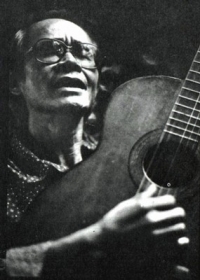
Trinh Cong Son (Trịnh Công Sơn) (February 28, 1939 – April 1, 2001) was a Vietnamese composer, musician, painter and songwriter. He, along with Pham Duy and Van Cao, is widely considered one of the three most salient figures of modern (non-classical) Vietnamese music.
Trinh Cong Son wrote over 600 songs, and, during the 1960s and 1970s, Joan Baez dubbed him the Bob Dylan of Vietnam for his moving antiwar songs. He became one of South Vietnam's best-known singer-songwriters, after his first hit, Ướt mi (Tearing 'Lashes) in 1957. He was frequently under pressure from the government, which was displeased with the pacifist's lyrics of such songs as Ngủ đi con (Lullaby, about a mother grieving for her soldier son). After the reunification in 1975, Son was sentenced by the new communist government, to "retraining" in a labour camp after his family fled to Canada. However, he was eventually honoured by the government and many officials sent their respects with floral tributes. His often melancholy songs about love and postwar reconciliation earned new acceptance and popularity in later years.
There are two singers' names often associated with Trinh Cong Son. One is Khanh Ly. The other one is Hong Nhung.
Khanh Ly, with her unique vocals, helped popularize Trinh Cong Son music in the early years. They often performed together in South Vietnam University Campuses. The voice and the music seemed to be inseparable.
Later on in his life, Hong Nhung, many years his junior, replaced Khanh Ly's place until his death.
Hundreds of thousands of people gathered at his funeral in Ho Chi Minh city, for a spontaneous ad hoc funeral concert, making such a spectacle the largest in Vietnamese history, next to the funeral procession of Ho Chi Minh. His music remains very popular among Vietnamese, old and young.
Trinh Cong Son wrote over 600 songs, and, during the 1960s and 1970s, Joan Baez dubbed him the Bob Dylan of Vietnam for his moving antiwar songs. He became one of South Vietnam's best-known singer-songwriters, after his first hit, Ướt mi (Tearing 'Lashes) in 1957. He was frequently under pressure from the government, which was displeased with the pacifist's lyrics of such songs as Ngủ đi con (Lullaby, about a mother grieving for her soldier son). After the reunification in 1975, Son was sentenced by the new communist government, to "retraining" in a labour camp after his family fled to Canada. However, he was eventually honoured by the government and many officials sent their respects with floral tributes. His often melancholy songs about love and postwar reconciliation earned new acceptance and popularity in later years.
There are two singers' names often associated with Trinh Cong Son. One is Khanh Ly. The other one is Hong Nhung.
Khanh Ly, with her unique vocals, helped popularize Trinh Cong Son music in the early years. They often performed together in South Vietnam University Campuses. The voice and the music seemed to be inseparable.
Later on in his life, Hong Nhung, many years his junior, replaced Khanh Ly's place until his death.
Hundreds of thousands of people gathered at his funeral in Ho Chi Minh city, for a spontaneous ad hoc funeral concert, making such a spectacle the largest in Vietnamese history, next to the funeral procession of Ho Chi Minh. His music remains very popular among Vietnamese, old and young.
Francis Poulenc
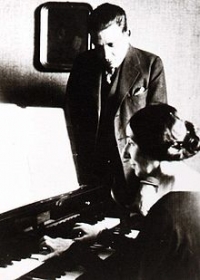
Francis Jean Marcel Poulenc (French pronunciation: (7 January 1899 - 30 January 1963) was a French composer and a member of the French group Les Six. He composed music in genres including art song, solo piano music, chamber music, oratorio, opera, ballet music, and orchestral music. Critic Claude Rostand, in a July 1950 Paris-Presse article, described Poulenc as "half monk, half delinquent" ("le moine et le voyou"), a tag that was to be attached to his name for the rest of his career.
Joao Pernambuco
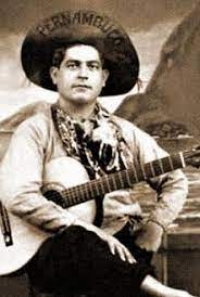
João Teixeira Guimarães, mais conhecido como João Pernambuco (Jatobá (atual Petrolândia), 2 de novembro de 1883 — Rio de Janeiro, 16 de outubro de 1947), foi um músico, compositor e violonista brasileiro.
Traditional

Joe Cocker
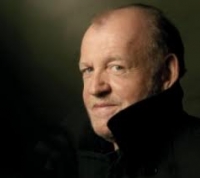
John Robert "Joe" Cocker, OBE (born 20 May 1944) is an English rock/blues musician, composer and actor who came to popularity in the 1960s, and is most known for his gritty voice, his idiosyncratic arm movements while performing, and his cover versions of popular songs, particularly those of The Beatles. He is the recipient of several awards, including a 1983 Grammy Award for his song "Up Where We Belong", a duet which he performed with Jennifer Warnes. He was ranked #97 on Rolling Stone's 100 greatest singers list.
Lestat
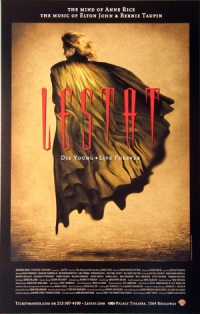
Lestat is a Broadway musical inspired by Anne Rice's The Vampire Chronicles.
This was the first theatrical score from the legendary songwriting team of Elton John and Bernie Taupin. Book by Linda Woolverton, and was directed by Robert Jess Roth with musical staging by Matt West.
The Broadway production opened on April 25, 2006 in the Palace Theater and closed on May 28, 2006.
The title role of Lestat was played by Hugh Panaro. The show was directed by Robert Jess Roth, who was a Tony Award nominee for his Broadway directorial debut for Beauty and the Beast, and also starred Carolee Carmello as Gabrielle, Drew Sarich as Armand, Jim Stanek as Louis, Roderick Hill as Nicolas, Michael Genet as Marius and Allison Fischer as Claudia.
Scenic design by Derek McLane, costume design by Susan Hilferty, lighting design by Kenneth Posner, sound design by Jonathan Deans, visual concept design by Dave McKean, and hair design by Tom Watson.
This was the first theatrical score from the legendary songwriting team of Elton John and Bernie Taupin. Book by Linda Woolverton, and was directed by Robert Jess Roth with musical staging by Matt West.
The Broadway production opened on April 25, 2006 in the Palace Theater and closed on May 28, 2006.
The title role of Lestat was played by Hugh Panaro. The show was directed by Robert Jess Roth, who was a Tony Award nominee for his Broadway directorial debut for Beauty and the Beast, and also starred Carolee Carmello as Gabrielle, Drew Sarich as Armand, Jim Stanek as Louis, Roderick Hill as Nicolas, Michael Genet as Marius and Allison Fischer as Claudia.
Scenic design by Derek McLane, costume design by Susan Hilferty, lighting design by Kenneth Posner, sound design by Jonathan Deans, visual concept design by Dave McKean, and hair design by Tom Watson.
Antonio Carlos Jobim

Antonio Carlos Brasileiro de Almeida Jobim (January 25, 1927 in Rio de Janeiro – December 8, 1994 in New York City), also known as Tom Jobim, was a Grammy Award-winning Brazilian songwriter, composer, arranger, singer, and pianist/guitarist. A primary force behind the creation of the bossa nova style, Jobim is acknowledged as one of the most influential popular composers of the 20th century. His songs have been performed by many singers and instrumentalists within Brazil and internationally.
Stevie Wonder

Stevie Wonder (born Stevland Hardaway Judkins on May 13, 1950, name later changed to Stevland Hardaway Morris) is an American singer-songwriter, multi-instrumentalist, and record producer. A prominent figure in popular music during the latter half of the 20th century , Wonder has recorded more than thirty top ten hits, won 26 Grammy Awards (a record for a solo artist), plus one for lifetime achievement, won an Academy Award for Best Song and been inducted into both the Rock and Roll and Songwriters halls of fame. He has also been awarded the Polar Music Prize.
Blind from infancy, Wonder signed with Motown Records as a pre-adolescent at age twelve, and continues to perform and record for the label to this day. He has nine U.S. number-one hits to his name (on the pop Charts, 20 U.S. R&B number one hits), and album sales totaling more than 150 million units. Wonder has recorded several critically acclaimed albums and hit singles, and writes and produces songs for many of his label mates and outside artists as well. Wonder plays the piano, synthesizer, harmonica, congas, drums, bongos, organ, melodica, and clavinet. In his early career, he was best known for his harmonica work, but today he is better known for his keyboard skills and vocals.
Blind from infancy, Wonder signed with Motown Records as a pre-adolescent at age twelve, and continues to perform and record for the label to this day. He has nine U.S. number-one hits to his name (on the pop Charts, 20 U.S. R&B number one hits), and album sales totaling more than 150 million units. Wonder has recorded several critically acclaimed albums and hit singles, and writes and produces songs for many of his label mates and outside artists as well. Wonder plays the piano, synthesizer, harmonica, congas, drums, bongos, organ, melodica, and clavinet. In his early career, he was best known for his harmonica work, but today he is better known for his keyboard skills and vocals.
Carlos Gardel

Carlos Gardel (11 December 1890 – 24 June 1935) was a singer, songwriter and actor, and is perhaps the most prominent figure in the history of tango. The unerring musicality of Gardel's baritone voice and the dramatic phrasing of his lyrics made miniature masterpieces of his hundreds of three-minute tango recordings. Together with lyricist and long-time collaborator Alfredo Le Pera, Gardel wrote several classic tangos, most notably "Mi Buenos Aires querido", "Por una cabeza" and "El día que me quieras".
Gardel died in an airplane crash at the height of his career, becoming an archetypal tragic hero mourned throughout Latin America. For many, Gardel embodies the soul of the tango style. He is commonly referred to as "Carlitos", "El Zorzal" (The Song Thrush), "The King of Tango", "El Mago" (The Magician) and "El Mudo" (The Mute).
Gardel died in an airplane crash at the height of his career, becoming an archetypal tragic hero mourned throughout Latin America. For many, Gardel embodies the soul of the tango style. He is commonly referred to as "Carlitos", "El Zorzal" (The Song Thrush), "The King of Tango", "El Mago" (The Magician) and "El Mudo" (The Mute).
Bill Withers
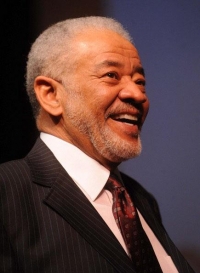
Bill Withers (born July 4, 1938 in Slab Fork, West Virginia) is an American singer-songwriter who performed and recorded from the late 1960s until the mid 1980s. Some of his best-known songs are "Ain't No Sunshine," "Use Me," "Lovely Day," "Lean on Me", "Grandma's Hands" and "Just the Two of Us".
Kelly Clarkson
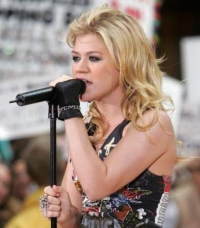
Kelly Brianne Clarkson (born April 24, 1982) is an American pop rock singer, songwriter, and occasional actress. Clarkson made her debut under RCA Records after she won the highly-publicized first season of the television series American Idol in 2002. She was originally marketed as a pop musician with her debut album Thankful (2003). With the release of her multi-platinum second album Breakaway (2004), Clarkson moved to a more pop rock-oriented style of music. Clarkson's third album, entitled My December, was released on June 26, 2007. Her fourth album is due in fall 2008. Clarkson has sold over 19 million albums worldwide. Clarkson is the most successful American Idol alumna, with eight of her singles becoming Top 10 hits on the Billboard Hot 100. In 2008, she joined Vh1's list of 10 sexiest women of the new millennium at #8. She also hit #28 on Vh1's Top 30 Hottest Rock Front women.
Sarah Mclahlan
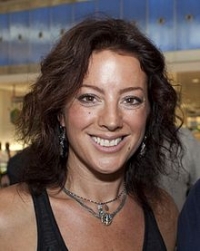
Sarah Ann McLachlan, OC, OBC (born January 28, 1968) is a Canadian musician, singer and songwriter. Known for her emotional ballads and mezzo-soprano vocal range, as of 2006, she has sold over 40 million albums worldwide. McLachlan's best-selling album to date is Surfacing, for which she won two Grammy Awards (out of four nominations) and four Juno Awards. In addition to her personal artistic efforts, she founded the Lilith Fair tour, which showcased female musicians. The Lilith Fair concert tours took place from 1997 to 1999, and resumed in the summer of 2010.
Taras Yachshenko
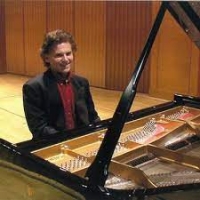
Tara Yachshenko ukrainian musician classical pianist, there are many classical music works.
Yael Naim
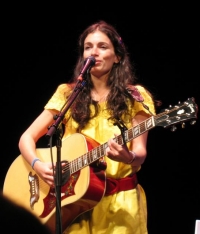
Yael Naim is a French-born Israeli singer and actress. She rose to fame in 2008 in the US after her hit single "New Soul" was used by Apple in an advertising campaign for its MacBook Air. The song peaked at No. 7 on the Billboard Hot 100.
Magome Togoshi
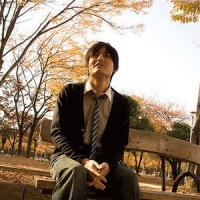
Magome Togoshi is a Japanese video game composer for visual novel studios. He began work as a music arranger in 1999, where he started working for the visual novel studio Key under VisualArt's to produce music for Kanon.
REM
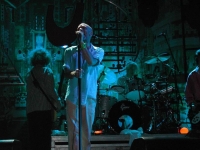
R.E.M. is an American rock band formed in Athens, Georgia, in 1980 by Michael Stipe (lead vocals), Peter Buck (guitar), Mike Mills (bass guitar), and Bill Berry (drums and percussion). R.E.M. was one of the first popular alternative rock bands, and gained early attention due to Buck's ringing, arpeggiated guitar style and Stipe's unclear vocals. R.E.M. released its first single, "Radio Free Europe", in 1981 on the independent record label Hib-Tone. The single was followed by the Chronic Town EP in 1982, the band's first release on I.R.S. Records. In 1983, the band released its critically acclaimed debut album Murmur, and built its reputation over the next few years through subsequent releases, constant touring, and the support of college radio. Following years of underground success, R.E.M. achieved a mainstream hit in 1987 with the single "The One I Love". The group signed to Warner Bros. Records in 1988, and began to espouse political and environmental concerns while playing large arenas worldwide.
By the early 1990s, when alternative rock began to experience broad mainstream success, R.E.M. was viewed as a pioneer of the genre and released its two most commercially successful albums, Out of Time (1991) and Automatic for the People (1992), which veered from the band's established sound. R.E.M.'s 1994 release Monster was a return to a more rock-oriented sound. The band began its first tour in six years to support the album; the tour was marred by medical emergencies suffered by three band members. In 1996, R.E.M. re-signed with Warner Bros. for a reported US$80 million, at the time the most expensive recording contract in history. The following year, Bill Berry left the band amicably, while Buck, Mills, and Stipe continued the group as a three-piece. Through some changes in musical style, the band continued its career into the next decade with mixed critical and commercial success. In 2007, the band was inducted into the Rock and Roll Hall of Fame.
By the early 1990s, when alternative rock began to experience broad mainstream success, R.E.M. was viewed as a pioneer of the genre and released its two most commercially successful albums, Out of Time (1991) and Automatic for the People (1992), which veered from the band's established sound. R.E.M.'s 1994 release Monster was a return to a more rock-oriented sound. The band began its first tour in six years to support the album; the tour was marred by medical emergencies suffered by three band members. In 1996, R.E.M. re-signed with Warner Bros. for a reported US$80 million, at the time the most expensive recording contract in history. The following year, Bill Berry left the band amicably, while Buck, Mills, and Stipe continued the group as a three-piece. Through some changes in musical style, the band continued its career into the next decade with mixed critical and commercial success. In 2007, the band was inducted into the Rock and Roll Hall of Fame.
J. S. Bach
Johann Sebastian Bach (21 March 1685, O.S.31 March 1685, N.S. – 28 July 1750, N.S.) was a German composer, organist, harpsichordist, violist, and violinist whose sacred and secular works for choir, orchestra, and solo instruments drew together the strands of the Baroque period and brought it to its ultimate maturity. Although he did not introduce new forms, he enriched the prevailing German style with a robust contrapuntal technique, an unrivalled control of harmonic and motivic organisation, and the adaptation of rhythms, forms and textures from abroad, particularly from Italy and France.
Revered for their intellectual depth, technical command and artistic beauty, Bach's works include the Brandenburg Concertos, the Goldberg Variations, the Partitas, The Well-Tempered Clavier, the Mass in B minor, the St Matthew Passion, the St John Passion, the Magnificat, A Musical Offering, The Art of Fugue, the English and French Suites, the Sonatas and Partitas for solo violin, the Cello Suites, more than 200 surviving cantatas, and a similar number of organ works, including the famous Toccata and Fugue in D minor and Passacaglia and Fugue in C minor, as well as the Great Eighteen Chorale Preludes and Organ Mass.
Bach's abilities as an organist were highly respected throughout Europe during his lifetime, although he was not widely recognised as a great composer until a revival of interest and performances of his music in the first half of the 19th century. He is now generally regarded as one of the main composers of the Baroque style, and as one of the greatest composers of all time.
Revered for their intellectual depth, technical command and artistic beauty, Bach's works include the Brandenburg Concertos, the Goldberg Variations, the Partitas, The Well-Tempered Clavier, the Mass in B minor, the St Matthew Passion, the St John Passion, the Magnificat, A Musical Offering, The Art of Fugue, the English and French Suites, the Sonatas and Partitas for solo violin, the Cello Suites, more than 200 surviving cantatas, and a similar number of organ works, including the famous Toccata and Fugue in D minor and Passacaglia and Fugue in C minor, as well as the Great Eighteen Chorale Preludes and Organ Mass.
Bach's abilities as an organist were highly respected throughout Europe during his lifetime, although he was not widely recognised as a great composer until a revival of interest and performances of his music in the first half of the 19th century. He is now generally regarded as one of the main composers of the Baroque style, and as one of the greatest composers of all time.
Hugo Reinhold
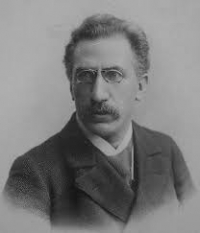
Hugo Reinhold (3 March 1854 – 4 September 1935) was an Austrian composer and pianist.He was born and died in Vienna. He was admitted to the Conservatorium der Musikfreunde, where he studied under Anton Bruckner, Felix Dessoff and Julius Epstein, among others. He left the conservatory at the age of 20, and later taught piano at the Akademie der Tonkunst in Vienna.During his lifetime he was quite popular and his works were performed by the Vienna Philharmonic and the Hellmesberger Quartet.
Don Marsh
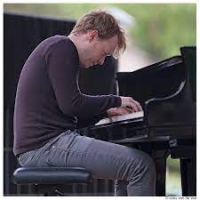
Don Marsh began his award winning career in print, radio and television journalism in 1959. His career included 12 years reporting in Germany and Baltimore before becoming a member of the St. Louis media community in 1971. .
Keith Emerson
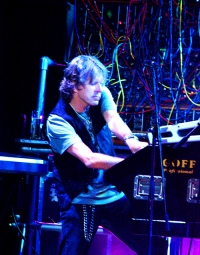
Keith Noel Emerson (2 November 1944 – 11 March 2016) was an English keyboardist, songwriter, and composer. He played keyboards in a number of bands before finding his first commercial success with the Nice in the late 1960s. He became internationally famous for his work with the Nice, which included writing rock arrangements of classical music. After leaving the Nice in 1970, he was a founding member of Emerson, Lake & Palmer (ELP), one of the early progressive rock supergroups.
Richard Clayderman
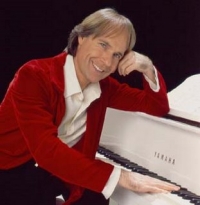
Richard Clayderman (born Philippe Pagès on December 28, 1953, Paris) is a French pianist who has released numerous albums including the original compositions by Paul de Senneville and Olivier Toussaint, and instrumental renditions of popular music, rearrangements of movie sound tracks, ethnic music, and easy-listening arrangements of most popular works of classical music.
In 1976 he was invited from Olivier Toussaint a French record producer and his partner Paul de Senneville to record a gentle piano ballad. Paul de Senneville had composed this ballad as a tribute to his new born daughter “Adeline”. The 23 year old Philippe Pagès was auditioned along with 20 other pianists. They liked his special and soft touch on the keyboards combined with his good looks and fine personality, and finally he got the job.
Philippe Pagès' name was changed to Richard Clayderman (he adopted his great-grandmother's last name to avoid mispronunciation of his real name outside France), and the single took off, selling an astonishing 22 million copies in 38 countries. It was called Ballade pour Adeline.
In 1976 he was invited from Olivier Toussaint a French record producer and his partner Paul de Senneville to record a gentle piano ballad. Paul de Senneville had composed this ballad as a tribute to his new born daughter “Adeline”. The 23 year old Philippe Pagès was auditioned along with 20 other pianists. They liked his special and soft touch on the keyboards combined with his good looks and fine personality, and finally he got the job.
Philippe Pagès' name was changed to Richard Clayderman (he adopted his great-grandmother's last name to avoid mispronunciation of his real name outside France), and the single took off, selling an astonishing 22 million copies in 38 countries. It was called Ballade pour Adeline.
Pachelbel

Johann Pachelbel (baptized September 1, 1653 – buried March 9, 1706) was a German Baroque composer, organist and teacher who brought the south German organ tradition to its peak. He composed a large body of sacred and secular music, and his contributions to the development of the chorale prelude and fugue have earned him a place among the most important composers of the middle Baroque era.
Pachelbel's work enjoyed enormous popularity during his lifetime; he had many pupils and his music became a model for the composers of south and central Germany. Today, Pachelbel is best known for the Canon in D, the only canon he wrote. In addition to the canon, his most well-known works include the Chaconne in F minor, the Toccata in E minor for organ, and the Hexachordum Apollinis, a set of keyboard variations.
Pachelbel's music was influenced by southern German composers, such as Johann Jakob Froberger and Johann Kaspar Kerll, Italians such as Girolamo Frescobaldi and Alessandro Poglietti, French composers, and the composers of the Nuremberg tradition. Pachelbel preferred a lucid, uncomplicated contrapuntal style that emphasized melodic and harmonic clarity. His music is less virtuosic and less adventurous harmonically than that of Dieterich Buxtehude, although, like Buxtehude, Pachelbel experimented with different ensembles and instrumental combinations in his chamber music and, most importantly, his vocal music, much of which features exceptionally rich instrumentation. Pachelbel explored many variation forms and associated techniques, which manifest themselves in various diverse pieces, from sacred concertos to harpsichord suites.
Pachelbel's work enjoyed enormous popularity during his lifetime; he had many pupils and his music became a model for the composers of south and central Germany. Today, Pachelbel is best known for the Canon in D, the only canon he wrote. In addition to the canon, his most well-known works include the Chaconne in F minor, the Toccata in E minor for organ, and the Hexachordum Apollinis, a set of keyboard variations.
Pachelbel's music was influenced by southern German composers, such as Johann Jakob Froberger and Johann Kaspar Kerll, Italians such as Girolamo Frescobaldi and Alessandro Poglietti, French composers, and the composers of the Nuremberg tradition. Pachelbel preferred a lucid, uncomplicated contrapuntal style that emphasized melodic and harmonic clarity. His music is less virtuosic and less adventurous harmonically than that of Dieterich Buxtehude, although, like Buxtehude, Pachelbel experimented with different ensembles and instrumental combinations in his chamber music and, most importantly, his vocal music, much of which features exceptionally rich instrumentation. Pachelbel explored many variation forms and associated techniques, which manifest themselves in various diverse pieces, from sacred concertos to harpsichord suites.
Oscar Peterson
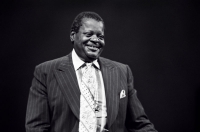
Oscar Emmanuel Peterson, CC, CQ, O.Ont. (August 15, 1925 – December 23, 2007) was a Canadian jazz pianist and composer. He was called the "Maharaja of the keyboard" by Duke Ellington, "O.P." by his friends, and was a member of jazz royalty. He released over 200 recordings, won seven Grammy Awards, and received other numerous awards and honours over the course of his career. He is considered to have been one of the greatest jazz pianists of all time, who played thousands of live concerts to audiences worldwide in a career lasting more than 65 years.
Johann Strauss

Johann Strauss I (March 14, 1804 – September 25, 1849; German: Johann Baptist Strauß, Johann Strauss (Vater); also Johann Baptist Strauss, Johann Strauss, Sr., the Elder, the Father), born in Vienna, was an Austrian Romantic composer famous for his waltzes, and for popularizing them alongside Joseph Lanner, thereby setting the foundations for his sons to carry on his musical dynasty. His most famous piece is probably the Radetzky March (named after Joseph Radetzky von Radetz), while his most famous waltz is probably the Lorelei Rheinklänge, Op. 154.
Black Eyed Peas
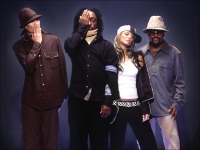
The Black Eyed Peas is an American hip hop group from Los Angeles. The group is currently composed of will.i.am, apl.de.ap, Taboo and Fergie. Since their breakout album Elephunk in 2003, they have seen international fame for their pop/dance-oriented style of hip hop music. Black Eyed Peas have sold an estimated twenty-seven million albums and singles worldwide.
Johnny Green
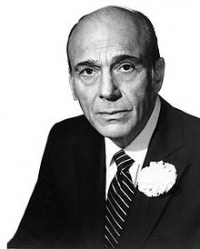
Johnny Green (10 October 1908 – 15 May 1989) was an American songwriter, composer, musical arranger, and conductor. He was given the nickname "Beulah" by colleague Conrad Salinger. His most famous song was one of his earliest, "Body and Soul". Green was inducted into the Songwriters Hall of Fame in 1972.
Enrico Morpurgo
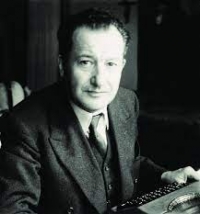
Enrico Morpurgo composer, teacher and musicologist
Real Book

The Real Book refers to compilations of lead sheets for jazz standards. It usually refers to the first volume of a series of books transcribed and collated by Berklee College of Music students during the 1970s.The name is derived from "fake books", so called because they contained only rough outlines of music pieces rather than fully notated scores. Early fake books were often used by professional bands who performed mostly standards, often more geared to society and dance bands rather than jazz ensembles, and devoted much space to show tunes, novelty tunes, traditional jazz, etc. The first three Real Book volumes, in contrast, contained many bebop and other jazz standards that were likely to be encountered on jazz gigs at the time. For this reason, the books were quickly adopted among jazz players in the 1970s, particularly on the east coast.
Jose Zarate
José Zárate y Rodríguez de Gaspar (11 de agosto de 1972) es un compositor y pianista español. José Zárate. 1ª foto oficial José Zárate.jpg.
Rosenkreuzstilette

Rosenkreuzstilette is a mega-action-platformer game in which you step into the shoes of Spiritia Rosenberg, a virtuous young woman caught on the wrong side of a revolution instigated by her closest friends.
Hatsune Miku

Hatsune Miku (Japanese: 初音 ミク) is the name of a Vocaloid software voicebank developed by Crypton Future Media and its official moe anthropomorph, a 16-year-old girl with long, turquoise twintails. She uses Yamaha Corporation's Vocaloid 2, Vocaloid 3, and Vocaloid 4 singing synthesizing technologies. She also uses Crypton Future Media's Piapro Studio, a singing synthesizer VSTi Plugin. She was the second Vocaloid sold using the Vocaloid 2 engine and the first Japanese Vocaloid to use the Japanese version of the Vocaloid 2 engine. Her voice is modeled from Japanese voice actress Saki Fujita. Miku's personification has been marketed as a virtual idol and has performed at concerts onstage as an animated projection (rear cast projection on a specially coated glass screen).
The name of the character comes from merging the Japanese words for first (初 hatsu), sound (音 ne), and future (ミク miku), thus meaning "the first sound of the future", referring to her position as the first of Crypton's "Character Vocal Series".
The name of the character comes from merging the Japanese words for first (初 hatsu), sound (音 ne), and future (ミク miku), thus meaning "the first sound of the future", referring to her position as the first of Crypton's "Character Vocal Series".
Scarlatti
Giuseppe Domenico Scarlatti was an Italian composer. He is classified primarily as a Baroque composer chronologically, although his music was influential in the development of the Classical style and he was one of the few Baroque composers to transition into the classical period.
Enya
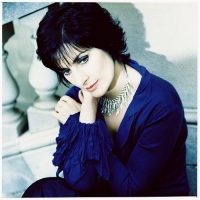
Enya (born Eithne Patricia Nà Bhraonáinon May 17, 1961, Gaoth Dobhair, County Donegal, Ireland), sometimes presented in the media as Enya Brennan, is an Irish singer, instrumentalist and composer. She is Ireland's best-selling solo artist and is officially the country's second biggest musical export (after U2). Her works have earned her four Grammy Awards and an Academy Award nomination, and she is also famous for performing in 10 different languages during her lengthy career. Enya is an approximate transcription of how Eithne is pronounced in her native Irish, in the Donegal dialect.
Henry Mancini

Henry Mancini (April 16, 1924 – June 14, 1994) was an American composer, conductor and arranger. He is remembered particularly for being a composer of film and television scores. Mancini also won a record number of Grammy awards, including a Grammy Lifetime Achievement Award in 1995. His best-known works are the jazz-idiom theme to The Pink Panther film series ("The Pink Panther Theme"), the Peter Gunn Theme (from the so-named series) and "Moon River".
Mancini was nominated for an unprecedented 72 Grammys, winning 20. Additionally he was nominated for 18 Academy Awards, winning four. He also won a Golden Globe Award and was nominated for two Emmys.
Mancini won a total of four Oscars for his music in the course of his career. He was first nominated for an Academy Award in 1955 for his original score of The Glenn Miller Story, on which he collaborated with Joseph Gershenson. He lost out to Adolph Deutsch and Saul Chaplin's Seven Brides for Seven Brothers. In 1962 he was nominated in the Best Music, Original Song category for "Bachelor in Paradise" from the film of the same name, in collaboration with lyricist Mack David. That song did not win. However, Mancini did receive two Oscars that year: one in the same category, for the song "Moon River" (shared with lyricist Johnny Mercer), and one for "Best Music, Scoring of a Dramatic or Comedy Picture" for Breakfast at Tiffany's. The following year, he and Mercer took another Best Song award for "Days of Wine and Roses," another eponymous theme song. His next eleven nominations went for naught, but he finally garnered one last statuette working with lyricist Leslie Bricusse on the score for Victor/Victoria, which won the "Best Music, Original Song Score and Its Adaptation or Best Adaptation Score" award for 1983. All three of the films for which he won were directed by Blake Edwards. His score for Victor/Victoria was adapted for the 1995 Broadway musical of the same name.
Mancini was nominated for an unprecedented 72 Grammys, winning 20. Additionally he was nominated for 18 Academy Awards, winning four. He also won a Golden Globe Award and was nominated for two Emmys.
Mancini won a total of four Oscars for his music in the course of his career. He was first nominated for an Academy Award in 1955 for his original score of The Glenn Miller Story, on which he collaborated with Joseph Gershenson. He lost out to Adolph Deutsch and Saul Chaplin's Seven Brides for Seven Brothers. In 1962 he was nominated in the Best Music, Original Song category for "Bachelor in Paradise" from the film of the same name, in collaboration with lyricist Mack David. That song did not win. However, Mancini did receive two Oscars that year: one in the same category, for the song "Moon River" (shared with lyricist Johnny Mercer), and one for "Best Music, Scoring of a Dramatic or Comedy Picture" for Breakfast at Tiffany's. The following year, he and Mercer took another Best Song award for "Days of Wine and Roses," another eponymous theme song. His next eleven nominations went for naught, but he finally garnered one last statuette working with lyricist Leslie Bricusse on the score for Victor/Victoria, which won the "Best Music, Original Song Score and Its Adaptation or Best Adaptation Score" award for 1983. All three of the films for which he won were directed by Blake Edwards. His score for Victor/Victoria was adapted for the 1995 Broadway musical of the same name.
Julio Domínguez
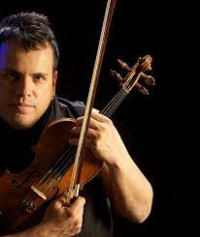
Violinist, Philharmonic Orchestra of Buenos Aires; Member, Gianneo String Quartet (which has toured to the major Chamber festivals in the world spreading Argentine music). Awards: Argentine Society of Music Critics Prize (three times, with Gianneo). Training: violin and viola at the Menuhin Academy (London, Switzerland) and in the Reina Sofia School in Madrid.
Creedence Clearwater Revival
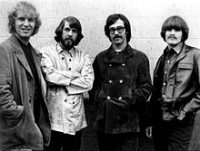
Creedence Clearwater Revival, also referred to as Creedence and CCR, was an American rock band that recorded and performed from 1959 to 1972 under various names before settling on the Creedence Clearwater Revival name in 1967. The band initially consisted of lead vocalist, lead guitarist, and primary songwriter John Fogerty; his brother, rhythm guitarist Tom Fogerty; bassist Stu Cook; and drummer Doug Clifford. These members had played together since 1959, first as the Blue Velvets and later as the Golliwogs.
Edward MacDowell
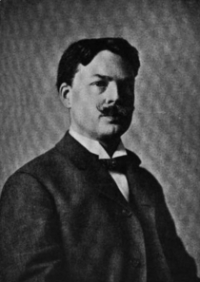
Edward Alexander MacDowell (December 18, 1860 – January 23, 1908) was an American composer and pianist of the Romantic period. He was best known for his second piano concerto and his piano suites "Woodland Sketches", "Sea Pieces", and "New England Idylls". "Woodland Sketches" includes his most popular short piece, "To a Wild Rose". In 1904 he was one of the first seven Americans honored by membership in the American Academy of Arts and Letters.
Andrew Volpe

Andrew Volpe is an actor and editor, known for Play the Game (2009), Rock Jocks (2012) and This ...Music Department: This Sucks (2012) Soundtrack: Play the Game (2009) Known For: Play the Game Soundtrack (2009) Actor: Cone of Shame Reed (2021)
Viladamir Davidovich
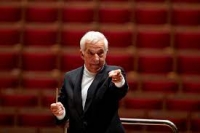
Vladimir Davidovich Ashkenazy is an internationally recognized solo pianist, chamber music performer, and conductor. He is originally from Russia and has held Icelandic citizenship since 1972. He has lived in Switzerland since 1978. Ashkenazy has collaborated with well-known orchestras and soloists.
 Sheet Music Max is a site for those who wants to access popular sheet music easily,
letting them download the sheet music for free for trial purposes.
It's completely free to download and try the listed sheet music, but you have to delete the files after 24 hours of trial.
Don't forget, if you like the piece of music you have just learned playing,
treat the artist with respect, and go buy the original sheet music.
Sheet Music Max is a site for those who wants to access popular sheet music easily,
letting them download the sheet music for free for trial purposes.
It's completely free to download and try the listed sheet music, but you have to delete the files after 24 hours of trial.
Don't forget, if you like the piece of music you have just learned playing,
treat the artist with respect, and go buy the original sheet music.

